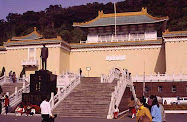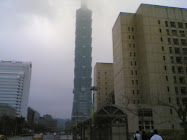Geography
Though the Republic of China's territory includes dozens of small islands in the Taiwan Strait and the Pacific, the main island known as Taiwan covers the vast majority of the land area under Taiwanese administration. Almost two-thirds of Taiwan is covered by mountains, with 258 peaks over 3,000m (9,850ft), most of them heavily forested. The highest of these, Yushan (Jade Mountain), is northeast Asia's tallest mountain at 3,952m (13,042ft).
While mountains dominate Taiwan's centre and rugged east coast, the island's western third is mostly alluvial plain and is host to most of the population. The two Pacific islands, Lyudao (Green Island) and Lanyu (Orchid Island), are popular holiday destinations, while the Taiwan Strait archipelagos of Penghu and Matzu hold historic and cultural appeal. And just a few kilometres off mainland China's Fujian coast, the tiny islands of Kinmen and Lieyu remain under Taiwanese control.
Recent History
President Chen Shui-bian, from the Democratic Progressive Party (DPP), was elected in 2000, ending more than 50 years of Nationalist (Kuomintang) rule. He was re-elected by a very narrow margin in March 2004, after a campaign focusing on formal independence for Taiwan. As a result, Beijing, which sees constitutional change as a dangerous step towards formal statehood for Taiwan, refuses to deal with Mr Chen.
Following elections in March 2008, Taiwan's newly-elected president, Ma Ying-jeou, pledged to establish better economic and political ties with China. President Ma Ying-jeou said he wants to work towards a peace treaty with Beijing, but would only do so if China removed missiles pointed at Taiwan.
Language
As is the case in mainland China, the official language of Taiwan is Mandarin Chinese, commonly referred to as guoyu (‘national language'). However, the native Taiwanese tongue, alternatively called taiyu or minnan hua, is still widely spoken as a first language by the island's dominant ethnic group, which originally hails from China's southern Fujian province.
Religion
‘Folk religion' - a blend of ancient animist beliefs with the traditions of Taoism, Buddhism and Confucianism - forms the core beliefs of most Taiwanese. Purer forms of Buddhism are also on the rise, along with Christianity.
Electricity
110 volts AC, 60Hz.
Social Conventions
Despite Taiwan's complex ethnic and cultural mix, its way of life is predominantly Chinese, steeped in tradition and marked by superstition. As such, often ancient customs and festivals are celebrated with fervour, and traditional holidays are closely observed. Taiwanese people are extremely friendly, and standards of hospitality are high. Entertainment is more commonly offered in restaurants than in private homes, and visitors are not usually expected to entertain. Handshaking is common, and casual wear is widely acceptable.



.jpg)





I hope I get to visit Taiwan one of this day!!!
ReplyDeleteNice article...Have a nice day...